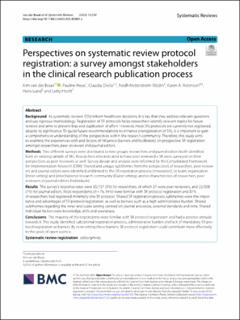| dc.description.abstract | Background:
As systematic reviews (SRs) inform healthcare decisions, it is key that they address relevant questions and use rigorous methodology. Registration of SR protocols helps researchers identify relevant topics for future reviews and aims to prevent bias and duplication of effort. However, most SRs protocols are currently not registered, despite its significance. To guide future recommendations to enhance preregistration of SRs, it is important to gain a comprehensive understanding of the perspectives within the research community. Therefore, this study aims to examine the experiences with and factors of influence (barriers and facilitators) on prospective SR registration amongst researchers, peer reviewers and journal editors.
Methods:
Two different surveys were distributed to two groups: researchers and journal editors both identified from an existing sample of SRs. Researchers who indicated to have peer reviewed a SR were surveyed on their perspectives as peer reviewers as well. Survey design and analysis were informed by the Consolidated Framework for Implementation Research (CFIR). Shared and unique subthemes from the perspectives of researchers, peer reviewers and journal editors were identified and linked to the SR registration process (Innovation), to team, organisation (Inner setting) and (inter)national research community (Outer setting), and to characteristics of researchers, peer reviewers or journal editors (Individuals).
Results:
The survey’s response rates were 65/727 (9%) for researchers, of which 37 were peer reviewers, and 22/308 (7%) for journal editors. Most respondents (n = 76, 94%) were familiar with SR protocol registration and 81% of researchers had registered minimally one SR protocol. Shared SR registration process subthemes were the importance and advantages of SR protocol registration, as well as barriers such as a high administrative burden. Shared subthemes regarding the inner and outer setting centred on journal processes, external standards and time. Shared individual factors were knowledge, skills and awareness.
Conclusions:
The majority of the respondents were familiar with SR protocol registration and had a positive attitude towards it. This study identified suboptimal registration process, administrative burden and lack of mandatory SR protocol registration as barriers. By overcoming these barriers, SR protocol registration could contribute more effectively to the goals of open science. | en_US |

